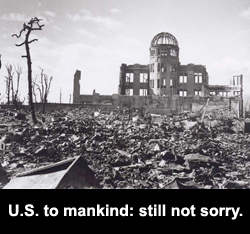Memory's minefield.
It's always interesting when American Presidents in particular visit nations we have destroyed in past wars. This past week President Obama traveled to Hiroshima to deliver the resounding message that we are not sorry ... repeat, not sorry ... for using the most destructive weapons in the history of mankind on this unfortunate community. He also delivered some claptrap about reducing the number of nuclear weapons, even as his administration moves forward with an ambitious plan to engineer a highly destabilizing new generation of nuclear weapons.
 Empire means more than never having to say you're sorry. It mostly means never even contemplating the concept of "sorry" - an imperial value not lost on the likes of NPR, whose Morning Edition host Renee Montagne reliably informed us that "in America - the view of the bombing - though everyone recognizes this as horrific - the view of the bombing is it was done because it had to be done." So that's what "the view" is, eh? Thanks, Renee. Up to your usual journalistic standards.
Empire means more than never having to say you're sorry. It mostly means never even contemplating the concept of "sorry" - an imperial value not lost on the likes of NPR, whose Morning Edition host Renee Montagne reliably informed us that "in America - the view of the bombing - though everyone recognizes this as horrific - the view of the bombing is it was done because it had to be done." So that's what "the view" is, eh? Thanks, Renee. Up to your usual journalistic standards.
Obama's previous stop was in Vietnam. No apologies there, either. Though the central thrust of his mission was to announce the lifting of an arms embargo on Vietnam that has been in place since the American war began, tightened under Reagan. Obama referred to this as a vestige of the Cold War, though the Cold War was not so cold in Vietnam, it bears reminding. Interestingly, the President's aims in Vietnam are not dissimilar from the aims of the American war itself. One of the core objectives of U.S. policy in its Indochina wars was that of keeping the region from accommodating to China so that they would instead provide materials, markets, and cheap labor to Japan - an American version of the "co-prosperity sphere" imperial Japan aggressively sought to establish in the 1930s and '40s.
Today, the goal is ... well ... to have Vietnam integrated into the American-led global economic order, via the TPP and other instruments, thereby containing what our government perceives as China's expansionism. It is, in some respects, an effort to reclaim the maximal objective of the Vietnam war, which proved beyond our reach. (I tend to agree with Chomsky, however, that the U.S. did, in fact, essentially prevail in the Vietnam war by destroying three countries and ensuring that Indochina's crippled post-war independence would serve as a model for no one.)
The coverage of this trip has been pretty abysmal. No surprise there. Once the mainstream media has worked out what "the view" is on a given topic, there's no point in wasting any energy on actual reporting.
luv u,
jp
 Empire means more than never having to say you're sorry. It mostly means never even contemplating the concept of "sorry" - an imperial value not lost on the likes of NPR, whose Morning Edition host Renee Montagne reliably informed us that "in America - the view of the bombing - though everyone recognizes this as horrific - the view of the bombing is it was done because it had to be done." So that's what "the view" is, eh? Thanks, Renee. Up to your usual journalistic standards.
Empire means more than never having to say you're sorry. It mostly means never even contemplating the concept of "sorry" - an imperial value not lost on the likes of NPR, whose Morning Edition host Renee Montagne reliably informed us that "in America - the view of the bombing - though everyone recognizes this as horrific - the view of the bombing is it was done because it had to be done." So that's what "the view" is, eh? Thanks, Renee. Up to your usual journalistic standards.
Obama's previous stop was in Vietnam. No apologies there, either. Though the central thrust of his mission was to announce the lifting of an arms embargo on Vietnam that has been in place since the American war began, tightened under Reagan. Obama referred to this as a vestige of the Cold War, though the Cold War was not so cold in Vietnam, it bears reminding. Interestingly, the President's aims in Vietnam are not dissimilar from the aims of the American war itself. One of the core objectives of U.S. policy in its Indochina wars was that of keeping the region from accommodating to China so that they would instead provide materials, markets, and cheap labor to Japan - an American version of the "co-prosperity sphere" imperial Japan aggressively sought to establish in the 1930s and '40s.
Today, the goal is ... well ... to have Vietnam integrated into the American-led global economic order, via the TPP and other instruments, thereby containing what our government perceives as China's expansionism. It is, in some respects, an effort to reclaim the maximal objective of the Vietnam war, which proved beyond our reach. (I tend to agree with Chomsky, however, that the U.S. did, in fact, essentially prevail in the Vietnam war by destroying three countries and ensuring that Indochina's crippled post-war independence would serve as a model for no one.)
The coverage of this trip has been pretty abysmal. No surprise there. Once the mainstream media has worked out what "the view" is on a given topic, there's no point in wasting any energy on actual reporting.
luv u,
jp
Comments